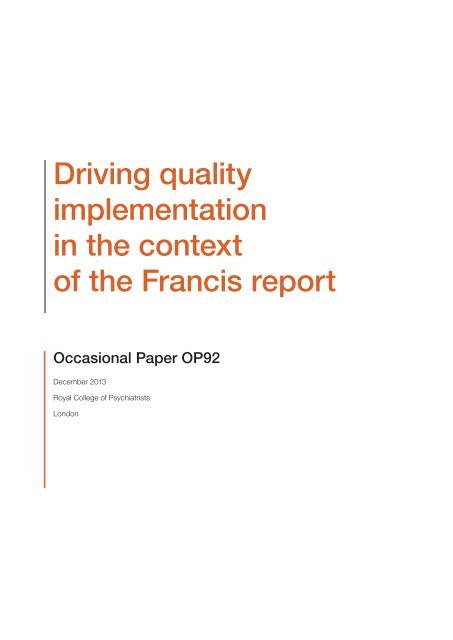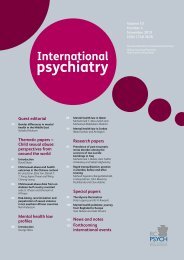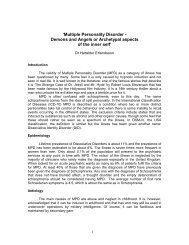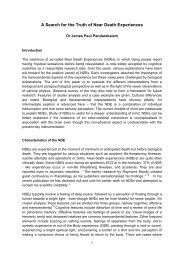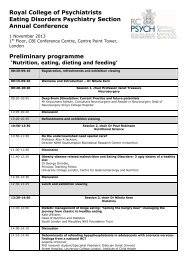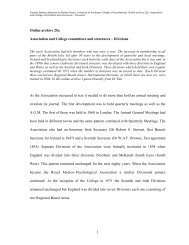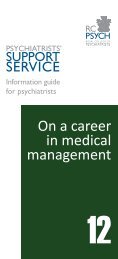Driving quality implementation in the context of the Francis report
Driving quality implementation in the context of the Francis report
Driving quality implementation in the context of the Francis report
Create successful ePaper yourself
Turn your PDF publications into a flip-book with our unique Google optimized e-Paper software.
<strong>Driv<strong>in</strong>g</strong> <strong>quality</strong><br />
<strong>implementation</strong><br />
<strong>in</strong> <strong>the</strong> <strong>context</strong><br />
<strong>of</strong> <strong>the</strong> <strong>Francis</strong> <strong>report</strong><br />
Occasional Paper OP92<br />
December 2013<br />
Royal College <strong>of</strong> Psychiatrists<br />
London
Pr<strong>of</strong>essor Sue Bailey, President <strong>of</strong> <strong>the</strong> Royal College <strong>of</strong> Psychiatrists, led this work. The <strong>report</strong> was drafted<br />
by Lucy Thorpe, Head <strong>of</strong> Policy, and Greg Smith, Policy Analyst, at <strong>the</strong> Royal College <strong>of</strong> Psychiatrists.<br />
© 2013 Royal College <strong>of</strong> Psychiatrists<br />
The Royal College <strong>of</strong> Psychiatrists is a charity registered <strong>in</strong> England and Wales (228636) and <strong>in</strong> Scotland (SC038369).
| | Contents<br />
2 Foreword<br />
4 Introduction and overview<br />
9 Pr<strong>in</strong>ciple one: always put patients first<br />
12 Pr<strong>in</strong>ciple two: prioritise patient safety and well-be<strong>in</strong>g<br />
15 Pr<strong>in</strong>ciple three: provide high-<strong>quality</strong> cl<strong>in</strong>ical leadership<br />
17 Pr<strong>in</strong>ciple four: respect regulation, <strong>in</strong>spection and accountability as<br />
support<strong>in</strong>g care<br />
20 Pr<strong>in</strong>ciple five: value <strong>the</strong> importance <strong>of</strong> outcomes and accurate data<br />
22 References<br />
Contents 1
| | Foreword<br />
Endless changes to <strong>the</strong> National Health Service (NHS) have been<br />
characterised by a top-down, managerial approach. As David Prior,<br />
Chair <strong>of</strong> <strong>the</strong> Care Quality Commission (CQC) observed recently, cl<strong>in</strong>icians<br />
have <strong>in</strong> part ‘allowed <strong>the</strong> false dichotomy <strong>of</strong> cl<strong>in</strong>ical leadership<br />
versus “management” to emerge’ and to go unchallenged. They have<br />
become disengaged from a culture characterised by obsession with<br />
f<strong>in</strong>ancial targets and systems whose purpose has been self-perpetuation<br />
<strong>of</strong> <strong>the</strong> organisation (Prior, 2013), while patients have – <strong>in</strong> some<br />
cases literally – faded away.<br />
Cl<strong>in</strong>icians risk drift<strong>in</strong>g <strong>in</strong>to an <strong>in</strong>sidious m<strong>in</strong>dset <strong>of</strong> learned helplessness;<br />
when <strong>the</strong>y speak out, <strong>the</strong>ir voice has at times been frail and<br />
even <strong>in</strong>audible.<br />
As cl<strong>in</strong>icians we need to listen to and learn from each o<strong>the</strong>r, and listen<br />
to and learn from our patients and <strong>the</strong>ir carers. We need to help <strong>the</strong><br />
organisations <strong>in</strong> which we work to take more seriously what has so<br />
rightly been called <strong>the</strong> ‘gold dust’ <strong>of</strong> compla<strong>in</strong>ts (The Independent,<br />
2013). We must take compla<strong>in</strong>ts more seriously and challenge riskaverse<br />
cultures. Above all, with<strong>in</strong> <strong>the</strong> Royal College <strong>of</strong> Psychiatrists we<br />
need to appropriately support whistle-blowers and o<strong>the</strong>r members<br />
whose work<strong>in</strong>g circumstances and <strong>the</strong> expectations placed on <strong>the</strong>m<br />
are <strong>in</strong>compatible with deliver<strong>in</strong>g safe practice.<br />
Cl<strong>in</strong>ical leadership, transparency and accountability are fundamental to<br />
<strong>the</strong> future <strong>of</strong> <strong>the</strong> NHS and all health and social care. Never before has<br />
<strong>the</strong>re been a stronger need for <strong>the</strong> family <strong>of</strong> medical Royal Colleges to<br />
stand toge<strong>the</strong>r to work on <strong>the</strong> fundamental commonalities <strong>of</strong> tackl<strong>in</strong>g<br />
unacceptable variability both <strong>in</strong> practice and <strong>in</strong> cl<strong>in</strong>ical outcomes,<br />
across geographies, 7 days a week.<br />
The Academy <strong>of</strong> Medical Royal Colleges is 220 000 doctors strong;<br />
our own College is 17 000 strong. Both need a unified voice to tackle<br />
<strong>the</strong> variation with<strong>in</strong> and across services throughout <strong>the</strong> UK.<br />
The College response to <strong>the</strong> <strong>Francis</strong> <strong>report</strong> <strong>the</strong>refore stands alongside<br />
and l<strong>in</strong>ks with <strong>the</strong> response <strong>of</strong> o<strong>the</strong>r medical Royal Colleges, allied<br />
health pr<strong>of</strong>essional bodies, providers, regulators, commissioners<br />
and educationalists. It has evolved from ongo<strong>in</strong>g discussion with<br />
and feedback from College Council, honorary <strong>of</strong>ficers, faculties, sections,<br />
divisions, <strong>the</strong> four UK jurisdictions, members, patients, carers,<br />
special <strong>in</strong>terest groups, College leads and special committees. This<br />
is <strong>the</strong>refore a dynamic document, which <strong>the</strong> College will revisit <strong>in</strong> 6<br />
months’ time. It provides an ethical framework aga<strong>in</strong>st which we will<br />
align and test College strategy and activities.<br />
2<br />
Occasional Paper OP92
Much work has already been undertaken to mitigate <strong>the</strong> realities <strong>of</strong><br />
<strong>the</strong> worst care seen <strong>in</strong> Mid Staffordshire NHS Foundation Trust and<br />
W<strong>in</strong>terbourne View hospital. Complacency, and see<strong>in</strong>g challenges as<br />
‘not my bus<strong>in</strong>ess’, have been, and will cont<strong>in</strong>ue to be, <strong>the</strong> enemy <strong>of</strong><br />
good, safe, whole-person patient care. Cont<strong>in</strong>uously review<strong>in</strong>g what<br />
works, test<strong>in</strong>g out, revisit<strong>in</strong>g and ref<strong>in</strong><strong>in</strong>g, are essential for provid<strong>in</strong>g<br />
values-based, whole-patient care. Most importantly, robust and cont<strong>in</strong>uous<br />
review <strong>of</strong> our own <strong>in</strong>dividual cl<strong>in</strong>ical and academic practice<br />
<strong>in</strong> diverse teams, organisations and sett<strong>in</strong>gs has to be underp<strong>in</strong>ned<br />
by <strong>in</strong>telligent k<strong>in</strong>dness.<br />
My s<strong>in</strong>cere thanks to <strong>the</strong> many College members and o<strong>the</strong>r colleagues<br />
who have responded with <strong>the</strong> wise thoughts and practical suggestions<br />
that have contributed to this response to <strong>the</strong> <strong>Francis</strong> <strong>report</strong>.<br />
Pr<strong>of</strong>essor Sue Bailey, OBE, FRCPsych<br />
President<br />
Foreword 3
| | Introduction and<br />
overview<br />
The <strong>Francis</strong> <strong>report</strong> has considered <strong>the</strong> whole <strong>of</strong> <strong>the</strong> medical and<br />
nurs<strong>in</strong>g pr<strong>of</strong>essions, ask<strong>in</strong>g difficult questions about <strong>the</strong> established<br />
practices <strong>of</strong> health pr<strong>of</strong>essionals. It holds lessons for every healthcare<br />
pr<strong>of</strong>essional, <strong>in</strong>clud<strong>in</strong>g psychiatrists, and also for allied health<br />
and social care pr<strong>of</strong>essionals. The Royal College <strong>of</strong> Psychiatrists and<br />
<strong>in</strong>dividual psychiatrists have a duty <strong>of</strong> care to our patients to address<br />
<strong>the</strong> issues raised.<br />
Although <strong>the</strong> <strong>Francis</strong> <strong>report</strong> focused on <strong>the</strong> care <strong>of</strong> patients <strong>in</strong> <strong>the</strong><br />
acute sector, <strong>the</strong> f<strong>in</strong>d<strong>in</strong>gs and recommendations are just as important<br />
for mental health patients. The College has carefully exam<strong>in</strong>ed<br />
<strong>the</strong> specific recommendations <strong>of</strong> <strong>the</strong> <strong>report</strong> to see how, work<strong>in</strong>g<br />
with o<strong>the</strong>rs, we can provide mental healthcare consistent with <strong>the</strong><br />
recommendations and standards set out <strong>in</strong> <strong>the</strong> <strong>report</strong>.<br />
The <strong>Francis</strong> <strong>report</strong> highlights <strong>the</strong> importance <strong>of</strong> see<strong>in</strong>g <strong>the</strong> provision<br />
<strong>of</strong> care from all perspectives, <strong>of</strong> <strong>in</strong>volv<strong>in</strong>g patients and carers at every<br />
stage, and above all <strong>of</strong> listen<strong>in</strong>g to <strong>the</strong>m. As doctors, we must work<br />
with<strong>in</strong> an ethical framework, and this must govern all <strong>the</strong> decisions<br />
we make every day <strong>in</strong> our cl<strong>in</strong>ical roles.<br />
The Royal College <strong>of</strong> Psychiatrists’ formal response to <strong>the</strong> <strong>Francis</strong><br />
<strong>report</strong>, and <strong>the</strong> work programme it sets out, are underp<strong>in</strong>ned by five<br />
pr<strong>in</strong>ciples.<br />
1 Always put patients first, engag<strong>in</strong>g openly and transparently<br />
with patients and carers about care and treatment – respect<strong>in</strong>g<br />
<strong>the</strong>ir wishes wherever possible.<br />
2 Prioritise patient safety and well-be<strong>in</strong>g.<br />
3 Provide high-<strong>quality</strong> cl<strong>in</strong>ical leadership with<strong>in</strong> teams <strong>of</strong> pr<strong>of</strong>essionals<br />
and <strong>in</strong> organisations.<br />
4 Respect regulation, <strong>in</strong>spection and accountability as support<strong>in</strong>g<br />
care.<br />
5 Value <strong>the</strong> importance <strong>of</strong> outcomes and accurate data <strong>in</strong><br />
improv<strong>in</strong>g patient care.<br />
Responses to <strong>in</strong>adequate or abusive practice tend to emphasise <strong>the</strong><br />
practical, ethical or moral fail<strong>in</strong>gs <strong>of</strong> <strong>in</strong>dividuals. These are relevant, but,<br />
alone, statements <strong>of</strong> <strong>the</strong> importance <strong>of</strong> compassion, patient-centred<br />
care and <strong>the</strong> duty <strong>of</strong> candour are unlikely to prevent fur<strong>the</strong>r scandals.<br />
Inadequate and abusive care arises <strong>in</strong> response to situational forces<br />
4<br />
Occasional Paper OP92
and a variety <strong>of</strong> behavioural cues. For example, <strong>the</strong> abusive behaviour<br />
so graphically shown <strong>in</strong> <strong>the</strong> BBC’s W<strong>in</strong>terbourne View television<br />
programme (BBC One Panorama, 2011) arose primarily as a consequence<br />
<strong>of</strong> plac<strong>in</strong>g vulnerable people with challeng<strong>in</strong>g behaviours<br />
under <strong>the</strong> care <strong>of</strong> ord<strong>in</strong>ary people <strong>in</strong> a closed environment. The primary<br />
fail<strong>in</strong>g at W<strong>in</strong>terbourne View was not failure to recognise that abuse<br />
was go<strong>in</strong>g on (which was a secondary fail<strong>in</strong>g) – it was <strong>the</strong> failure to<br />
recognise that such behaviour was highly likely to arise <strong>in</strong> that sett<strong>in</strong>g<br />
unless active steps were taken to prevent it.<br />
Similarly, <strong>the</strong> fail<strong>in</strong>gs <strong>in</strong> <strong>the</strong> Mid Staffordshire NHS Foundation Trust<br />
occurred <strong>in</strong> a culture that prioritised organisational needs over patient<br />
care. Staff were bound to respond to managerial imperatives. If provid<strong>in</strong>g<br />
good <strong>quality</strong> <strong>of</strong> care and ensur<strong>in</strong>g good patient experience<br />
are not prioritised, <strong>the</strong>y will always suffer when o<strong>the</strong>r behaviours are<br />
be<strong>in</strong>g rewarded. We need to take on board <strong>the</strong> lessons <strong>of</strong> <strong>the</strong> Milgram<br />
(1974) and Zimbardo (Haney et al, 1973) experiments (research which<br />
was conducted 40 years ago), namely that ord<strong>in</strong>ary, decent people<br />
will behave badly <strong>in</strong> environments that are not designed to help <strong>the</strong>m<br />
to behave well.<br />
<strong>Francis</strong> recognises <strong>the</strong> unhelpful nature <strong>of</strong> a blame culture. However,<br />
for him systemic factors seem to be adm<strong>in</strong>istrative ra<strong>the</strong>r than about<br />
psychosocial relationships, group and <strong>in</strong>stitutional dynamics. What<br />
is miss<strong>in</strong>g from his analysis is a psychological perspective.<br />
What is required to prevent poor practice is <strong>the</strong> sett<strong>in</strong>g up <strong>of</strong> proper<br />
systems <strong>of</strong> supervision, understand<strong>in</strong>g what pressures staff are experienc<strong>in</strong>g,<br />
tak<strong>in</strong>g action when th<strong>in</strong>gs go a bit wrong ra<strong>the</strong>r than wait<strong>in</strong>g<br />
until <strong>the</strong>y are very wrong, and mak<strong>in</strong>g patient feedback a key <strong>in</strong>dicator<br />
<strong>of</strong> performance.<br />
Essentially, compassion <strong>in</strong> care is about tra<strong>in</strong><strong>in</strong>g, education and pr<strong>of</strong>essional<br />
responsibilities for self-care. Ensur<strong>in</strong>g that <strong>the</strong> workforce feels<br />
healthy, confident and supported, and that pr<strong>of</strong>essionals are enabled<br />
and encouraged to focus on <strong>the</strong>ir own as well as <strong>the</strong>ir patients’<br />
well-be<strong>in</strong>g, is important for <strong>the</strong>m to be able to function effectively.<br />
At an organisational level, work undertaken by <strong>the</strong> College <strong>in</strong> response<br />
to <strong>the</strong> <strong>Francis</strong> <strong>report</strong> will <strong>in</strong>clude <strong>the</strong> follow<strong>in</strong>g.<br />
1 Emphasis<strong>in</strong>g cl<strong>in</strong>ical leadership as a core attribute for all psychiatrists,<br />
based on <strong>in</strong>tegrity, moral values and <strong>in</strong>telligent k<strong>in</strong>dness,<br />
and def<strong>in</strong>ed as:<br />
◦{<br />
implement<strong>in</strong>g standards <strong>of</strong> high-<strong>quality</strong> care<br />
◦{<br />
support<strong>in</strong>g colleagues and build<strong>in</strong>g teams<br />
◦{<br />
speak<strong>in</strong>g out when poor practice is identified and be<strong>in</strong>g part<br />
<strong>of</strong> <strong>the</strong> solution<br />
◦{<br />
cont<strong>in</strong>u<strong>in</strong>g <strong>the</strong> College’s ongo<strong>in</strong>g commitment to achiev<strong>in</strong>g<br />
parity <strong>of</strong> esteem for mental health.<br />
2 Def<strong>in</strong><strong>in</strong>g <strong>quality</strong> standards, which <strong>in</strong>clude compassion and<br />
patient-centred care, through <strong>the</strong> work <strong>of</strong> <strong>the</strong> College Centre<br />
Introduction and overview 5
for Quality Improvement (CCQI), and consider<strong>in</strong>g <strong>the</strong> implications<br />
<strong>of</strong> <strong>the</strong> <strong>Francis</strong> <strong>report</strong> for <strong>the</strong> accreditation processes run<br />
by <strong>the</strong> CCQI.<br />
3 Develop<strong>in</strong>g mechanisms with providers to support cl<strong>in</strong>icians<br />
rais<strong>in</strong>g concerns about services, through:<br />
◦{<br />
creat<strong>in</strong>g a culture where <strong>the</strong> cl<strong>in</strong>ical voice is strong and heard<br />
◦{<br />
creat<strong>in</strong>g a culture <strong>in</strong> which cl<strong>in</strong>icians are supported so that<br />
<strong>the</strong>y <strong>in</strong> turn will support patients<br />
◦{<br />
develop<strong>in</strong>g College guidance to psychiatrists on whistleblow<strong>in</strong>g<br />
and/or pass<strong>in</strong>g on concerns.<br />
4 Lead<strong>in</strong>g <strong>the</strong> development and <strong>implementation</strong> <strong>of</strong> <strong>the</strong> Quality Mark<br />
for Elder-Friendly Hospital Wards to benefit elderly patients across<br />
<strong>the</strong> whole range <strong>of</strong> medical care. This is be<strong>in</strong>g developed with key<br />
partners: Age UK, <strong>the</strong> British Geriatrics Society, <strong>the</strong> Royal College<br />
<strong>of</strong> Nurs<strong>in</strong>g and <strong>the</strong> Royal College <strong>of</strong> Physicians (www.rcpsych.<br />
ac.uk/<strong>quality</strong>/<strong>quality</strong>andaccreditation/elder-friendly<strong>quality</strong>mark.<br />
aspx).<br />
5 Fur<strong>the</strong>r work on develop<strong>in</strong>g outcome <strong>in</strong>dicators to improve<br />
<strong>in</strong>dividual and team practice and focus more on patient/carer<br />
experience outcomes, toge<strong>the</strong>r with cl<strong>in</strong>ical outcomes. This will<br />
<strong>in</strong>clude develop<strong>in</strong>g patient-related outcome measures and composite<br />
outcome data <strong>in</strong> partnership with patients and carers.<br />
6 Work<strong>in</strong>g with <strong>the</strong> Health Foundation and o<strong>the</strong>r medical Royal<br />
Colleges to share good practice to streng<strong>the</strong>n <strong>the</strong> role <strong>of</strong> pr<strong>of</strong>essionals<br />
<strong>in</strong> improv<strong>in</strong>g service <strong>quality</strong>.<br />
7 Cont<strong>in</strong>u<strong>in</strong>g to publish f<strong>in</strong>d<strong>in</strong>gs from <strong>the</strong> National Audits <strong>the</strong> CCQI<br />
is commissioned to undertake (such as <strong>the</strong> National Audit <strong>of</strong><br />
Schizophrenia), to contribute to collective learn<strong>in</strong>g and service<br />
improvement.<br />
8 Publish<strong>in</strong>g a code <strong>of</strong> ethics for our members.<br />
9 Us<strong>in</strong>g any opportunities provided by <strong>the</strong> Shape <strong>of</strong> Tra<strong>in</strong><strong>in</strong>g Review<br />
(Greenaway, 2013) to look anew at our tra<strong>in</strong><strong>in</strong>g programmes to<br />
ensure <strong>the</strong>y are fit for purpose and will produce <strong>the</strong> psychiatrists<br />
that patients need. We will, with o<strong>the</strong>rs, review tra<strong>in</strong><strong>in</strong>g across<br />
<strong>the</strong> whole <strong>of</strong> medic<strong>in</strong>e to <strong>in</strong>crease <strong>the</strong> psychological m<strong>in</strong>dedness<br />
<strong>of</strong> all doctors practis<strong>in</strong>g <strong>in</strong> all medical discipl<strong>in</strong>es.<br />
10 Through tra<strong>in</strong><strong>in</strong>g and lifelong learn<strong>in</strong>g, we will improve our skills<br />
<strong>in</strong> prevent<strong>in</strong>g, identify<strong>in</strong>g and respond<strong>in</strong>g to our patients’ physical<br />
healthcare needs.<br />
11 College work on public mental health will focus on improv<strong>in</strong>g <strong>the</strong><br />
well-be<strong>in</strong>g <strong>of</strong> whole populations. Both pr<strong>of</strong>essional and lay carers<br />
have to manage <strong>the</strong>ir own health and well-be<strong>in</strong>g to be effective,<br />
and should be supported by care organisations to operate to <strong>the</strong><br />
highest ethical and personal care standards. Pr<strong>of</strong>essionals must<br />
adhere to agreed standards <strong>of</strong> pr<strong>of</strong>essionalised care practices,<br />
which should <strong>in</strong>clude compassion and due regard to patients’<br />
concerns and priorities. Courses on public mental health are<br />
be<strong>in</strong>g developed, <strong>in</strong>clud<strong>in</strong>g a shared approach with <strong>the</strong> UK’s<br />
6<br />
Occasional Paper OP92
Faculty <strong>of</strong> Public Health, to which self-care and pr<strong>of</strong>essional<br />
well-be<strong>in</strong>g will be central.<br />
12 The College will host a meet<strong>in</strong>g <strong>of</strong> senior mental health <strong>of</strong>ficials<br />
from each <strong>of</strong> <strong>the</strong> UK governments at its annual International<br />
Congress to enable exploration <strong>of</strong> common issues for mental<br />
health for all jurisdictions <strong>of</strong> <strong>the</strong> UK.<br />
CCQI Enabl<strong>in</strong>g Environments<br />
Award<br />
Through <strong>the</strong> CCQI <strong>the</strong> College is <strong>in</strong> a position to help monitor and raise<br />
standards <strong>of</strong> care by help<strong>in</strong>g <strong>in</strong>dividual cl<strong>in</strong>icians and cl<strong>in</strong>ical teams<br />
assess and improve <strong>the</strong> <strong>quality</strong> <strong>of</strong> care <strong>the</strong>y provide. The Enabl<strong>in</strong>g<br />
Environments Award (www.rcpsych.ac.uk/work<strong>in</strong>psychiatry/<strong>quality</strong>improvement/<strong>quality</strong>andaccreditation/enabl<strong>in</strong>genvironments.aspx)<br />
recognises that good relationships promote well-be<strong>in</strong>g, but that many<br />
organisations and groups fail to address this aspect <strong>of</strong> people’s lives.<br />
The Award is a <strong>quality</strong> mark given to those who can demonstrate <strong>the</strong>y<br />
are achiev<strong>in</strong>g an outstand<strong>in</strong>g level <strong>of</strong> best practice <strong>in</strong> creat<strong>in</strong>g and<br />
susta<strong>in</strong><strong>in</strong>g a positive and effective social environment. It is specifically<br />
designed to allow services to assess <strong>the</strong> extent to which <strong>the</strong>y actively<br />
listen and respond to <strong>the</strong> views <strong>of</strong> front-l<strong>in</strong>e staff and patients.<br />
RCPsych <strong>in</strong> Wales<br />
In consider<strong>in</strong>g both <strong>the</strong> <strong>Francis</strong> <strong>report</strong> (<strong>Francis</strong>, 2013) and <strong>the</strong> <strong>report</strong><br />
on W<strong>in</strong>terbourne View (Department <strong>of</strong> Health, 2013a), <strong>the</strong> RCPsych<br />
<strong>in</strong> Wales will focus on several important areas: local health board<br />
plans to fulfil <strong>the</strong> recommendations <strong>of</strong> <strong>the</strong> reviews; plans set by <strong>the</strong><br />
Welsh Assembly Government to ensure that outcomes are be<strong>in</strong>g<br />
met and <strong>the</strong>ir impact on mental health pr<strong>of</strong>essionals; how services<br />
can be better commissioned; and how to safeguard whistle-blow<strong>in</strong>g.<br />
There will be a conference on ‘<strong>the</strong> age <strong>of</strong> anxious practice’, with <strong>the</strong><br />
Health M<strong>in</strong>ister for Wales, <strong>the</strong> Chief Executive <strong>of</strong> Health Inspectorate<br />
Wales and a Senior Assessment Advisor from <strong>the</strong> National Cl<strong>in</strong>ical<br />
Assessment Service.<br />
RCPsych <strong>in</strong> Nor<strong>the</strong>rn Ireland<br />
In Nor<strong>the</strong>rn Ireland, <strong>the</strong> College’s current emphasis on <strong>the</strong> correlation<br />
between good psychiatric leadership and management and safer,<br />
more cl<strong>in</strong>ically effective services with improved patient experience<br />
has ga<strong>in</strong>ed fur<strong>the</strong>r significance <strong>in</strong> <strong>the</strong> light <strong>of</strong> <strong>the</strong> <strong>Francis</strong> <strong>report</strong>. The<br />
f<strong>in</strong>d<strong>in</strong>gs have also lent considerable momentum to <strong>the</strong> ongo<strong>in</strong>g roll<br />
out <strong>of</strong> <strong>the</strong> Implement<strong>in</strong>g Recovery through Organisational Change<br />
(ImROC) programme <strong>in</strong> Nor<strong>the</strong>rn Ireland. F<strong>in</strong>ally, its long-stand<strong>in</strong>g<br />
Introduction and overview 7
prioritisation <strong>of</strong> listen<strong>in</strong>g to <strong>the</strong> lived experience <strong>of</strong> patients and carers<br />
has ga<strong>in</strong>ed ever greater importance.<br />
RCPsych <strong>in</strong> Scotland<br />
Toge<strong>the</strong>r with <strong>the</strong> Academy <strong>of</strong> Medical Royal Colleges and Faculties<br />
<strong>in</strong> Scotland, <strong>the</strong> RCPsych <strong>in</strong> Scotland is contribut<strong>in</strong>g to <strong>in</strong>itiatives that<br />
will support <strong>the</strong> <strong>Francis</strong> recommendations. The College is a lead<strong>in</strong>g<br />
participant <strong>in</strong> <strong>the</strong> Scottish Patient Safety Programme for Mental<br />
Health; this was a major topic at its national academic meet<strong>in</strong>g <strong>in</strong><br />
September 2013.<br />
RCPsych Divisions <strong>in</strong> England<br />
The priority for <strong>the</strong> College’s Divisions <strong>in</strong> England is to support <strong>the</strong><br />
development <strong>of</strong> high-<strong>quality</strong> practice through ma<strong>in</strong>ta<strong>in</strong><strong>in</strong>g and develop<strong>in</strong>g<br />
standards. Each Division will:<br />
• z focus on provid<strong>in</strong>g high-<strong>quality</strong> educational events that ma<strong>in</strong>ta<strong>in</strong><br />
and develop mentors’ and tra<strong>in</strong>ees’ expertise <strong>in</strong> <strong>the</strong> areas <strong>of</strong> <strong>the</strong>ir<br />
cont<strong>in</strong>uous pr<strong>of</strong>essional development (CPD) that cannot be met<br />
easily with<strong>in</strong> <strong>the</strong>ir organisation and specialty<br />
z • fur<strong>the</strong>r develop its recruitment <strong>in</strong>itiatives to help ensure <strong>the</strong> provision<br />
<strong>of</strong> a high standard <strong>of</strong> consultant psychiatrists for future<br />
services.<br />
8<br />
Occasional Paper OP92
| | Pr<strong>in</strong>ciple one: always put<br />
patients first<br />
‘It is a common compla<strong>in</strong>t by patients and <strong>the</strong>ir carers that <strong>the</strong> various services are not “receptive”<br />
to our comments. It is <strong>the</strong> usual response <strong>of</strong> disbelief or just not accept<strong>in</strong>g any comments<br />
especially if [<strong>the</strong>y have] <strong>the</strong> mildest h<strong>in</strong>t <strong>of</strong> criticism’ (member <strong>of</strong> <strong>the</strong> College Carers’ Forum).<br />
‘We must put patients at <strong>the</strong> heart <strong>of</strong> everyth<strong>in</strong>g that we do’ (Pr<strong>of</strong>essor Sue Bailey, President).<br />
‘Patients, <strong>the</strong>ir carers, <strong>the</strong>ir families and <strong>the</strong> public need good psychiatrists. Good psychiatrists<br />
make <strong>the</strong> care <strong>of</strong> <strong>the</strong>ir patients <strong>the</strong>ir first concern: <strong>the</strong>y are competent; keep <strong>the</strong>ir knowledge<br />
up to date; are able and will<strong>in</strong>g to use new research evidence to <strong>in</strong>form practice; establish<br />
and ma<strong>in</strong>ta<strong>in</strong> good relationships with patients, carers, families and colleagues; are honest and<br />
trustworthy, and act with <strong>in</strong>tegrity. Good psychiatrists have good communication skills, respect<br />
for o<strong>the</strong>rs and are sensitive to <strong>the</strong> views <strong>of</strong> <strong>the</strong>ir patients, carers and families. A good psychiatrist<br />
must be able to consider <strong>the</strong> ethical implications <strong>of</strong> treatment and cl<strong>in</strong>ical management<br />
regimes. The pr<strong>in</strong>ciples <strong>of</strong> fairness, respect, e<strong>quality</strong>, dignity and autonomy are considered<br />
fundamental to good ethical psychiatric practice’ (Good Psychiatric Practice, Royal College<br />
<strong>of</strong> Psychiatrists, 2009).<br />
The <strong>Francis</strong> <strong>report</strong> highlights <strong>the</strong> need for<br />
patient-centred care and <strong>the</strong> consequences <strong>of</strong><br />
fail<strong>in</strong>g to put patients first <strong>in</strong> a healthcare sett<strong>in</strong>g.<br />
Knowledge and skills are only one aspect <strong>of</strong> this;<br />
it takes <strong>the</strong> right attitude, culture and values to<br />
deliver true patient-centered care.<br />
Psychiatrists must be advocates for <strong>the</strong>ir patients,<br />
do<strong>in</strong>g th<strong>in</strong>gs ‘with’ ra<strong>the</strong>r than ‘to’ <strong>the</strong>m, consider<strong>in</strong>g<br />
<strong>the</strong>ir <strong>in</strong>dividual circumstances and develop<strong>in</strong>g<br />
<strong>in</strong>dividual care plans with<strong>in</strong> a framework <strong>of</strong> consistent<br />
evidence-based practice. Psychiatrists<br />
must work as a team with patients, carers and<br />
colleagues, and do this with compassion, dignity<br />
and respect.<br />
The NHS Constitution (Department <strong>of</strong> Health,<br />
2013b) commits all NHS staff to:<br />
‘be[<strong>in</strong>g] open with patients, <strong>the</strong>ir families, carers or<br />
representatives, <strong>in</strong>clud<strong>in</strong>g if anyth<strong>in</strong>g goes wrong;<br />
welcom<strong>in</strong>g and listen<strong>in</strong>g to feedback and address<strong>in</strong>g<br />
concerns promptly and <strong>in</strong> a spirit <strong>of</strong> co-operation’.<br />
This is alongside General Medical Council (GMC)<br />
Good Medical Practice (2013) which sets out <strong>the</strong><br />
requirement for all doctors to:<br />
‘listen to patients, take account <strong>of</strong> <strong>the</strong>ir views, and<br />
respond honestly to <strong>the</strong>ir questions [and] be open<br />
and honest with patients if th<strong>in</strong>gs go wrong’.<br />
An important strand <strong>of</strong> patient-centred care is<br />
cont<strong>in</strong>uous and consistent focus, action and monitor<strong>in</strong>g<br />
centred on <strong>the</strong> m<strong>in</strong>imisation <strong>of</strong> harm and<br />
risk. In <strong>the</strong> <strong>context</strong> <strong>of</strong> mental health this can <strong>in</strong>clude<br />
m<strong>in</strong>imis<strong>in</strong>g <strong>the</strong> risk <strong>of</strong> a patient harm<strong>in</strong>g <strong>the</strong>mselves<br />
or o<strong>the</strong>rs, and, unlike <strong>the</strong> rest <strong>of</strong> medic<strong>in</strong>e, psychiatrists<br />
have an additional role and responsibility<br />
<strong>in</strong> that <strong>the</strong>y are given <strong>the</strong> power to deta<strong>in</strong> people<br />
under relevant mental health legislation.<br />
The comprehensive assessment <strong>of</strong> <strong>the</strong> patient<br />
must at all times <strong>in</strong>volve <strong>the</strong> patient as fully as<br />
possible, weigh<strong>in</strong>g risk with <strong>in</strong>put from all those<br />
who need to be <strong>in</strong>volved, and putt<strong>in</strong>g <strong>in</strong> place a<br />
plan which respects <strong>in</strong>dividual autonomy as much<br />
as possible, with <strong>the</strong> understand<strong>in</strong>g that <strong>the</strong>rapeutic<br />
risk must be balanced aga<strong>in</strong>st restrictions<br />
Pr<strong>in</strong>ciple one: always put patients first 9
to <strong>in</strong>dividual autonomy. This is even more important<br />
when <strong>the</strong>re are potential risks to o<strong>the</strong>rs, when<br />
psychiatrists support decision-mak<strong>in</strong>g processes<br />
across multi-agency teams to decide on <strong>the</strong> optimum<br />
way forward, protect<strong>in</strong>g both <strong>the</strong> public and<br />
<strong>the</strong> patient <strong>in</strong> a thoughtful, considered and pr<strong>of</strong>essional<br />
way.<br />
College action<br />
1 The College will cont<strong>in</strong>ue to support and<br />
develop best practice, and publish educational<br />
materials to support patient-centred<br />
pr<strong>of</strong>essionalism and care.<br />
2 The College will revise its <strong>report</strong> Good<br />
Psychiatric Practice to <strong>in</strong>corporate <strong>the</strong> necessary<br />
lessons from <strong>the</strong> <strong>Francis</strong> <strong>report</strong>.<br />
3 The College recognises that it is crucial to<br />
recruit doctors with person-centred skills and<br />
values, and we will explore how our recruitment<br />
methods might become more values<br />
based.<br />
4 The College will cont<strong>in</strong>ue to <strong>in</strong>fluence<br />
<strong>the</strong> development and <strong>implementation</strong> <strong>of</strong><br />
patient-centred mental health policy and<br />
legislation.<br />
5 We will work <strong>in</strong> partnership with patients and<br />
carers to develop all <strong>of</strong> <strong>the</strong> above.<br />
Patient Safety Expert Advisory Group<br />
The Group is currently updat<strong>in</strong>g two major College<br />
<strong>report</strong>s which asserted <strong>the</strong> need for compassionate<br />
care and collaboration with patients and<br />
carers – Reth<strong>in</strong>k<strong>in</strong>g Risk to O<strong>the</strong>rs <strong>in</strong> Mental Health<br />
Services (Royal College <strong>of</strong> Psychiatrists, 2008),<br />
due <strong>in</strong> 2014, with reference to <strong>the</strong> f<strong>in</strong>d<strong>in</strong>gs and<br />
recommendations <strong>of</strong> <strong>the</strong> <strong>Francis</strong> <strong>report</strong>, and Self-<br />
Harm, Suicide and Risk: Help<strong>in</strong>g People who<br />
Self-Harm (Royal College <strong>of</strong> Psychiatrists, 2010),<br />
which will be reviewed at a later date.<br />
Faculty <strong>of</strong> <strong>the</strong> Psychiatry <strong>of</strong> Old Age<br />
The <strong>Francis</strong> <strong>report</strong> is particularly poignant and relevant<br />
for old age psychiatry. Many <strong>of</strong> <strong>the</strong> vulnerable<br />
people who formed <strong>the</strong> basis <strong>of</strong> <strong>the</strong> <strong>report</strong> were<br />
elderly. There is no complacency <strong>in</strong> old age psychiatry<br />
regard<strong>in</strong>g <strong>the</strong> issues raised by <strong>the</strong> <strong>report</strong>.<br />
<strong>Francis</strong> states that car<strong>in</strong>g approaches are applicable<br />
to all, but makes particular mention <strong>of</strong> elderly<br />
people. All staff need to understand life-cycle<br />
changes and dependency issues <strong>in</strong> old age.<br />
The Faculty has established a work<strong>in</strong>g party to<br />
consider <strong>the</strong> implications <strong>of</strong> <strong>the</strong> <strong>Francis</strong> <strong>report</strong> for<br />
psychiatric care for <strong>the</strong> elderly.<br />
Faculty <strong>of</strong> General Adult Psychiatry<br />
We recognise <strong>the</strong> pr<strong>of</strong>ound importance <strong>of</strong> <strong>the</strong><br />
<strong>Francis</strong> <strong>report</strong> and its core recommendation that<br />
patients must be at <strong>the</strong> heart <strong>of</strong> everyth<strong>in</strong>g we<br />
do. We must bear <strong>in</strong> our m<strong>in</strong>ds <strong>the</strong> need to treat<br />
patients not only with technical expertise, but also<br />
understand<strong>in</strong>g and compassion. To this end, <strong>the</strong><br />
Faculty has established a ‘compassion <strong>in</strong> care’<br />
workstream which aims to make sure that <strong>the</strong><br />
right values are <strong>in</strong>stilled <strong>in</strong> psychiatrists from <strong>the</strong>ir<br />
tra<strong>in</strong><strong>in</strong>g onwards, are ma<strong>in</strong>ta<strong>in</strong>ed <strong>in</strong> <strong>the</strong> cl<strong>in</strong>ical<br />
workplace, and that psychiatrists model <strong>the</strong>se<br />
values for o<strong>the</strong>rs.<br />
Compassion and competence are <strong>the</strong>mes <strong>of</strong> <strong>the</strong><br />
Faculty’s residential conference <strong>in</strong> 2014.<br />
Faculty <strong>of</strong> Medical Psycho<strong>the</strong>rapy<br />
Consultant psychiatrists <strong>in</strong> medical psycho<strong>the</strong>rapy<br />
are <strong>in</strong>creas<strong>in</strong>gly active <strong>in</strong> develop<strong>in</strong>g, lead<strong>in</strong>g<br />
and deliver<strong>in</strong>g flexible <strong>in</strong>tegrated services for<br />
people with a diagnosis <strong>of</strong> severe and complex<br />
personality disorder. These services are delivered<br />
across cl<strong>in</strong>ical pathways through primary care,<br />
secondary mental healthcare, local authority and<br />
crim<strong>in</strong>al justice provisions, and specialist treatment<br />
services provided locally with<strong>in</strong> borough/county<br />
and nationally <strong>in</strong> specially commissioned tier 4<br />
<strong>in</strong>-patient personality disorder treatment services.<br />
Not uncommonly, this patient group has faced<br />
cumulative adversities and can become fixed <strong>in</strong><br />
<strong>the</strong>ir response pattern to adversity – a response<br />
that is frequently replicated <strong>in</strong> <strong>the</strong> services set up<br />
to manage <strong>the</strong>ir extreme difficulties <strong>in</strong> car<strong>in</strong>g for<br />
<strong>the</strong>mselves safely and <strong>in</strong> relat<strong>in</strong>g to o<strong>the</strong>rs.<br />
A Faculty member has recently taken on leadership<br />
<strong>of</strong> a tier 4 <strong>in</strong>-patient service that was rigid and<br />
fixed <strong>in</strong> its approach to challenge and change. He,<br />
<strong>the</strong> multidiscipl<strong>in</strong>ary team and <strong>the</strong> patients have<br />
decided to encourage patients to be present and<br />
10<br />
Occasional Paper OP92
active <strong>in</strong> all discussions about <strong>the</strong>ir care <strong>in</strong> ward<br />
rounds, <strong>in</strong> care programme approach meet<strong>in</strong>gs<br />
and <strong>in</strong> mental health tribunal reviews. In addition,<br />
<strong>the</strong> multidiscipl<strong>in</strong>ary team has re<strong>in</strong>troduced<br />
a monthly carers’ forum. The consultant is <strong>in</strong>volv<strong>in</strong>g<br />
all families <strong>in</strong> meet<strong>in</strong>gs with <strong>the</strong>ir family member <strong>in</strong><br />
treatment to build towards recovery and discovery<br />
<strong>of</strong> a new way <strong>of</strong> liv<strong>in</strong>g safely and with purpose.<br />
Patients and <strong>the</strong>ir families, as well as staff, referrers<br />
and commissioners, have responded very<br />
positively to this approach and have welcomed <strong>the</strong><br />
opportunities to engage openly and transparently.<br />
Pr<strong>in</strong>ciple one: always put patients first 11
| | Pr<strong>in</strong>ciple two: prioritise<br />
patient safety and<br />
well-be<strong>in</strong>g<br />
‘Hav<strong>in</strong>g recently gone through <strong>the</strong> process <strong>of</strong> be<strong>in</strong>g <strong>in</strong> a service <strong>in</strong> which maltreatment is<br />
tolerated under <strong>the</strong> guise <strong>of</strong> keep<strong>in</strong>g <strong>the</strong> carers and o<strong>the</strong>r pr<strong>of</strong>essionals on board, I blew <strong>the</strong><br />
whistle. I acted on GMC guidel<strong>in</strong>es stat<strong>in</strong>g that it is a doctor’s duty <strong>of</strong> care to <strong>report</strong> any worry<strong>in</strong>g<br />
practice. The result has been that I have been victimised, stigmatised and pr<strong>of</strong>essionally<br />
penalised. It is <strong>of</strong> no use whatsoever that <strong>the</strong>re is a duty <strong>of</strong> candour if <strong>the</strong>re is no protection for<br />
those who actually do put patients first and raise <strong>the</strong> alarm’ (College member).<br />
Mental health services need to provide high-<strong>quality</strong><br />
care which is safe, cl<strong>in</strong>ically effective and <strong>of</strong>fers<br />
optimal patient experience. Every psychiatrist must<br />
embed patient safety <strong>in</strong>to daily practice.<br />
Appropriate staff<strong>in</strong>g – both <strong>in</strong> terms <strong>of</strong> numbers<br />
and <strong>the</strong> skill mix be<strong>in</strong>g matched to patient need –<br />
is necessary to actually deliver safe services and<br />
to enable pr<strong>of</strong>essionals to support each o<strong>the</strong>r <strong>in</strong><br />
<strong>the</strong>ir work.<br />
Provid<strong>in</strong>g a forum for discussion and understand<strong>in</strong>g<br />
<strong>of</strong> work-related problems and feel<strong>in</strong>gs can<br />
prevent <strong>the</strong>m be<strong>in</strong>g acted out. It addresses <strong>the</strong><br />
m<strong>in</strong>dlessness and detachment that may characterise<br />
some staff/patient <strong>in</strong>teraction.<br />
Part <strong>of</strong> <strong>the</strong> College’s role is to facilitate high-<strong>quality</strong><br />
care through:<br />
• z <strong>the</strong> <strong>quality</strong> networks run by <strong>the</strong> CCQI and its<br />
accreditation <strong>of</strong> services<br />
• z develop<strong>in</strong>g new outcome measures<br />
• z support<strong>in</strong>g appropriate <strong>in</strong>formation-shar<strong>in</strong>g<br />
between health and social care<br />
• z foster<strong>in</strong>g and support<strong>in</strong>g good multidiscipl<strong>in</strong>ary<br />
work<strong>in</strong>g (via <strong>the</strong> Interpr<strong>of</strong>essional Mental<br />
Health Senate 1 )<br />
• z work<strong>in</strong>g appropriately with government regulators<br />
and <strong>in</strong>spection systems (see also<br />
Pr<strong>in</strong>ciple four, pp. 17–19).<br />
Provid<strong>in</strong>g high<strong>quality</strong><br />
services<br />
Rightly, much emphasis is placed on National<br />
Institute for Health and Care Excellence (NICE)<br />
guidel<strong>in</strong>es as provid<strong>in</strong>g evidence about cl<strong>in</strong>ical<br />
effectiveness and <strong>the</strong> <strong>quality</strong> <strong>of</strong> care. However,<br />
we need to recognise that guidel<strong>in</strong>es make recommendations<br />
based on published research:<br />
<strong>the</strong> more high-<strong>quality</strong> studies <strong>the</strong>re are, <strong>the</strong> more<br />
robust <strong>the</strong> guidel<strong>in</strong>e.<br />
To deliver improved <strong>quality</strong> <strong>of</strong> care for patients,<br />
high-<strong>quality</strong> research and appropriately tra<strong>in</strong>ed<br />
researchers are needed. Mental illness is <strong>the</strong> lead<strong>in</strong>g<br />
cause <strong>of</strong> years lived with disability <strong>in</strong> Western<br />
Europe and a major global public health problem.<br />
We <strong>the</strong>refore need more fund<strong>in</strong>g for mental health<br />
research, equivalent to o<strong>the</strong>r medical conditions<br />
such as cancer and heart disease. The College will<br />
cont<strong>in</strong>ue to press governments for more research<br />
fund<strong>in</strong>g for mental health for <strong>the</strong> express purpose<br />
<strong>of</strong> achiev<strong>in</strong>g better patient outcomes.<br />
1 This is an <strong>in</strong>formal group<strong>in</strong>g <strong>of</strong> six pr<strong>of</strong>essional bodies and<br />
organisations represent<strong>in</strong>g <strong>the</strong> majority <strong>of</strong> <strong>the</strong> workforce<br />
(British Association <strong>of</strong> Social Work, British Psychological<br />
Society, College <strong>of</strong> Occupational Therapists, College <strong>of</strong><br />
Social Workers, Royal College <strong>of</strong> Nurs<strong>in</strong>g, Royal College <strong>of</strong><br />
Psychiatrists) that provides care and treatment to people with<br />
mental health problems <strong>in</strong> <strong>the</strong> UK. Members have a shared<br />
<strong>in</strong>terest <strong>in</strong> <strong>in</strong>form<strong>in</strong>g mental health policy and practice and <strong>in</strong><br />
ensur<strong>in</strong>g that health reforms and restructur<strong>in</strong>g improve and<br />
enhance services. The Senate meets four times a year.<br />
12<br />
Occasional Paper OP92
College actions<br />
The College is work<strong>in</strong>g to:<br />
1 Fur<strong>the</strong>r develop its own guidance to psychiatrists<br />
on whistle-blow<strong>in</strong>g or pass<strong>in</strong>g on<br />
concerns, as transparency and candour are<br />
at <strong>the</strong> heart <strong>of</strong> good psychiatric practice.<br />
2 Monitor <strong>the</strong> <strong>implementation</strong> <strong>of</strong> core cl<strong>in</strong>ical<br />
guidel<strong>in</strong>es.<br />
3 Support NICE to evolve guidel<strong>in</strong>es for ‘real<br />
world’ care pathways (e.g. request<strong>in</strong>g that<br />
NICE develop acute care pathways that can<br />
embrace primary and secondary care, mental<br />
health, and accident and emergency).<br />
4 Update <strong>the</strong> exist<strong>in</strong>g College guidel<strong>in</strong>es on risk<br />
to self and o<strong>the</strong>rs.<br />
5 Work with <strong>the</strong> College <strong>of</strong> Mental Health<br />
Pharmacy, <strong>the</strong> Royal Pharmaceutical Society<br />
and <strong>the</strong> Royal College <strong>of</strong> General Practitioners<br />
to reduce medication errors.<br />
6 Support <strong>in</strong>novative projects <strong>in</strong> suicide prevention<br />
and o<strong>the</strong>r areas <strong>of</strong> care.<br />
7 Improve safety tra<strong>in</strong><strong>in</strong>g <strong>in</strong> <strong>the</strong> College membership<br />
exam<strong>in</strong>ation and CPD.<br />
8 Support and protect members who have been<br />
victimised for whistle-blow<strong>in</strong>g.<br />
Faculty <strong>of</strong> Medical Psycho<strong>the</strong>rapy<br />
The Faculty <strong>of</strong> Medical Psycho<strong>the</strong>rapy has long<br />
recognised <strong>the</strong> importance <strong>of</strong> develop<strong>in</strong>g psychological<br />
m<strong>in</strong>dedness <strong>in</strong> psychiatrists, alongside all<br />
o<strong>the</strong>r members <strong>of</strong> multidiscipl<strong>in</strong>ary teams work<strong>in</strong>g<br />
<strong>in</strong> mental health services. In its strategy for <strong>the</strong><br />
education and tra<strong>in</strong><strong>in</strong>g <strong>of</strong> psychiatrists, <strong>the</strong> Faculty<br />
is seek<strong>in</strong>g to create opportunities to develop <strong>the</strong><br />
capacities <strong>of</strong> psychiatrists to reflect on <strong>in</strong>teractions<br />
between <strong>the</strong>mselves and <strong>the</strong>ir patients <strong>in</strong> a way<br />
that enhances both <strong>the</strong> emotional development <strong>of</strong><br />
psychiatrists and <strong>the</strong> <strong>quality</strong> <strong>of</strong> <strong>the</strong> care <strong>the</strong>y give to<br />
<strong>the</strong>ir patients. A good example <strong>of</strong> this is <strong>the</strong> provision<br />
<strong>of</strong> ‘reflective practice groups’ for psychiatrists<br />
at different stages <strong>of</strong> <strong>the</strong>ir pr<strong>of</strong>essional life cycles.<br />
These meet regularly and consistently, and have<br />
a focus on learn<strong>in</strong>g from <strong>the</strong> <strong>in</strong>teractions between<br />
doctor and patient. The difficulties and strengths<br />
<strong>of</strong> patients can be recognised, explored, understood<br />
and worked with as a result <strong>of</strong> this learn<strong>in</strong>g.<br />
Likewise, <strong>the</strong> difficulties and strengths <strong>of</strong> psychiatrists<br />
can be recognised, explored, understood and<br />
worked with for <strong>the</strong> benefit <strong>of</strong> <strong>the</strong> wider range <strong>of</strong><br />
patients seen throughout <strong>the</strong> psychiatrist’s career.<br />
Good health organisations recognise <strong>the</strong> value<br />
<strong>of</strong> this approach and seek to develop it to ensure<br />
more active <strong>the</strong>rapeutic work with patients.<br />
Faculty <strong>of</strong> Liaison Psychiatry<br />
The Faculty <strong>of</strong> Liaison Psychiatry has made explicit<br />
five work streams essential to realis<strong>in</strong>g <strong>the</strong> ambitions<br />
<strong>of</strong> <strong>the</strong> <strong>Francis</strong> <strong>report</strong>:<br />
• z models <strong>of</strong> care: all commissioners will understand<br />
what an effective model <strong>of</strong> liaison<br />
psychiatry service looks like for <strong>the</strong>ir hospital<br />
and acute care pathway<br />
• z outcomes: all commissioners will have access<br />
to a balanced scorecard <strong>of</strong> service outcomes,<br />
<strong>in</strong>clud<strong>in</strong>g benefit to <strong>the</strong> patient, <strong>the</strong> referrer,<br />
<strong>the</strong> hospital and <strong>the</strong> system<br />
• z payment and pric<strong>in</strong>g: all commissioners will<br />
know how much an effective model <strong>of</strong> liaison<br />
psychiatry costs and operate it with<strong>in</strong><br />
an economy able to return <strong>the</strong> value to <strong>the</strong><br />
system<br />
• z workforce: all services will be able to draw<br />
on a tra<strong>in</strong>ed and supervised consultant-led<br />
multipr<strong>of</strong>essional workforce, supported<br />
by accessible education and tra<strong>in</strong><strong>in</strong>g<br />
programmes<br />
• z research and development: health services<br />
research will exam<strong>in</strong>e models <strong>of</strong> care, skill<br />
mix, <strong>in</strong>terventions and outcomes to <strong>in</strong>form<br />
NICE guidance, expert <strong>report</strong>s and future<br />
commission<strong>in</strong>g.<br />
Faculty <strong>of</strong> Academic Psychiatry<br />
A thorough grasp <strong>of</strong> new research f<strong>in</strong>d<strong>in</strong>gs and<br />
openness to new ideas is essential for good cl<strong>in</strong>ical<br />
leadership, which <strong>in</strong> turn relies on <strong>the</strong> symbiosis<br />
between research, teach<strong>in</strong>g and delivery <strong>of</strong> cl<strong>in</strong>ical<br />
care.<br />
L<strong>in</strong>ks between university departments and cl<strong>in</strong>ical<br />
services should be streng<strong>the</strong>ned. Standards<br />
are raised when research, teach<strong>in</strong>g and cl<strong>in</strong>ical<br />
activity (<strong>in</strong>clud<strong>in</strong>g commission<strong>in</strong>g) go hand <strong>in</strong><br />
Pr<strong>in</strong>ciple two: prioritise patient safety and well-be<strong>in</strong>g 13
hand. The Faculty is work<strong>in</strong>g with <strong>the</strong> Academy<br />
<strong>of</strong> Medical Sciences to help fulfil its recommendations<br />
for streng<strong>the</strong>n<strong>in</strong>g academic tra<strong>in</strong><strong>in</strong>g <strong>in</strong><br />
psychiatry (Academy <strong>of</strong> Medical Sciences, 2013).<br />
This <strong>in</strong>cludes <strong>in</strong>creas<strong>in</strong>g <strong>the</strong> exposure <strong>of</strong> medical<br />
students to psychiatric research, fellowships for<br />
students to perform electives <strong>in</strong> research at academic<br />
centres, and ensur<strong>in</strong>g an adequate network<br />
<strong>of</strong> research mentors and supervisors nationally for<br />
medical students and tra<strong>in</strong>ee psychiatrists to l<strong>in</strong>k<br />
up to perform research.<br />
Faculty <strong>of</strong> Forensic Psychiatry<br />
The Faculty considers that patient care <strong>in</strong> forensic<br />
services would benefit from 7-day consultant-led<br />
review across a range <strong>of</strong> forensic services deal<strong>in</strong>g<br />
with issues such as community crises, prison<br />
transfers, management <strong>of</strong> risk, seclusion decision<br />
and changes <strong>in</strong> treatment. Many <strong>of</strong> <strong>the</strong>se areas<br />
are already addressed <strong>in</strong> trusts where forensic<br />
consultant psychiatrists share on-call responsibility<br />
with general adult services, but this is not uniform<br />
across trusts. The Faculty is also consider<strong>in</strong>g<br />
o<strong>the</strong>r developments to address <strong>the</strong> f<strong>in</strong>d<strong>in</strong>gs <strong>of</strong> <strong>the</strong><br />
<strong>Francis</strong> <strong>report</strong>, such as a prison hotl<strong>in</strong>e for urgent<br />
even<strong>in</strong>g assessments, <strong>in</strong>put to police cells and <strong>the</strong><br />
probation service.<br />
Per<strong>in</strong>atal Section<br />
Members <strong>of</strong> <strong>the</strong> Section are advis<strong>in</strong>g on <strong>the</strong> revision<br />
<strong>of</strong> <strong>the</strong> antenatal and postnatal mental health NICE<br />
guidel<strong>in</strong>e. The Section is also produc<strong>in</strong>g a jo<strong>in</strong>t<br />
consensus statement with <strong>the</strong> British Association<br />
for Psychopharmacology on prescrib<strong>in</strong>g for<br />
pregnant and postnatal women, due for publication<br />
<strong>in</strong> 2014.<br />
14<br />
Occasional Paper OP92
| | Pr<strong>in</strong>ciple three: provide<br />
high-<strong>quality</strong> cl<strong>in</strong>ical<br />
leadership<br />
‘I believe that psychiatrists chose this career <strong>in</strong> order to lead, and not simply to advise on<br />
medication’ (College member).<br />
Cl<strong>in</strong>ical leadership is essential for high-<strong>quality</strong> care,<br />
and all doctors are leaders. We need to ensure that<br />
medical leadership is expected and supported by<br />
<strong>the</strong> culture <strong>of</strong> NHS trusts, to allow responsibility to<br />
go hand <strong>in</strong> hand with authority. Psychiatrists must<br />
play a leadership role <strong>in</strong> <strong>the</strong>ir cl<strong>in</strong>ical teams and <strong>in</strong><br />
<strong>the</strong>ir organisations.<br />
Good medical leadership demands an enquir<strong>in</strong>g<br />
and <strong>in</strong>tellectually flexible m<strong>in</strong>d that is grounded <strong>in</strong><br />
a thorough understand<strong>in</strong>g <strong>of</strong> current and future<br />
directions <strong>of</strong> <strong>the</strong> science <strong>of</strong> mental illness and its<br />
treatment. Sometimes leadership demands courage<br />
and, as <strong>in</strong> science, <strong>the</strong> ability to communicate<br />
<strong>the</strong> ‘truth’ demanded by evidence, not political<br />
expediency.<br />
With leadership comes accountability. We must all<br />
strive for improvement and be able to challenge our<br />
colleagues and employers when <strong>the</strong>re is evidence<br />
<strong>of</strong> poor practice.<br />
Many mental health teams are formally led by <strong>the</strong><br />
consultant psychiatrist. In o<strong>the</strong>rs, psychiatrists have<br />
a de facto leadership role. Junior doctors also have<br />
a significant role to play, and must be encouraged<br />
to speak out, both to challenge bad practice and<br />
to <strong>in</strong>novate.<br />
All doctors need, and have a duty, to develop personal<br />
leadership skills at all stages <strong>of</strong> <strong>the</strong>ir careers<br />
and to work effectively with<strong>in</strong> multidiscipl<strong>in</strong>ary<br />
teams, <strong>in</strong>clud<strong>in</strong>g with non-cl<strong>in</strong>ical managers. The<br />
College will work to facilitate and support <strong>the</strong>se<br />
objectives.<br />
Psychiatrists, whe<strong>the</strong>r or not <strong>in</strong> formal medical<br />
management roles, must:<br />
• z advocate and implement excellent care with<strong>in</strong><br />
<strong>the</strong>ir teams<br />
• z promote a patient-safety-first culture, and<br />
embed this <strong>in</strong> daily practice<br />
• z support and enable colleagues to deliver<br />
high-<strong>quality</strong> care<br />
• z promote a culture where colleagues feel safe<br />
and supported <strong>in</strong> rais<strong>in</strong>g concerns.<br />
We need to be aware that too much ‘top-down’<br />
regulation can impede progress and <strong>in</strong>hibit free<br />
th<strong>in</strong>k<strong>in</strong>g or criticism. Consultants and medical tra<strong>in</strong>ees<br />
must be empowered to lead and work with<br />
cl<strong>in</strong>ical and non-cl<strong>in</strong>ical management colleagues<br />
<strong>in</strong> <strong>the</strong> delivery <strong>of</strong> high-<strong>quality</strong> care without fear <strong>of</strong><br />
retribution.<br />
The <strong>Francis</strong> <strong>report</strong> states:<br />
‘A truly car<strong>in</strong>g culture does not stop at <strong>the</strong> door <strong>of</strong> <strong>the</strong><br />
hospital provider. It should never be acceptable for<br />
patients to be discharged at any time without knowledge<br />
that <strong>the</strong> patient <strong>in</strong> need <strong>of</strong> care will receive it<br />
on arrival at <strong>the</strong>ir dest<strong>in</strong>ation. The emphasis should<br />
be on cont<strong>in</strong>uity <strong>of</strong> care to <strong>in</strong>clude a follow-up as to<br />
a patient’s well-be<strong>in</strong>g after discharge.’<br />
Cont<strong>in</strong>uity <strong>of</strong> care is particularly important <strong>in</strong><br />
psychiatry, whe<strong>the</strong>r <strong>in</strong> hospital or <strong>in</strong> community<br />
sett<strong>in</strong>gs, but many services have been reorganised<br />
so that assessment and cont<strong>in</strong>ued care are separated,<br />
without clear benefits or evidence (Tyrer,<br />
2013). To avoid such changes or untried ‘models<br />
Pr<strong>in</strong>ciple three: provide high-<strong>quality</strong> cl<strong>in</strong>ical leadership 15
<strong>of</strong> care’ be<strong>in</strong>g imposed, cl<strong>in</strong>ical leaders need to be<br />
<strong>in</strong>volved <strong>in</strong> strategy and commission<strong>in</strong>g.<br />
Psychiatrists need to have a formal communication<br />
structure with senior management, such as a jo<strong>in</strong>t<br />
committee with members <strong>of</strong> a trust’s executive<br />
team, to help ensure that service development<br />
balances cl<strong>in</strong>ical need with corporate strategy.<br />
Consultants must set an example to tra<strong>in</strong>ees, who<br />
require (and must receive):<br />
• z support<br />
• z supervision<br />
• z encouragement to speak to carers<br />
• z empowerment<br />
• z time for reflective th<strong>in</strong>k<strong>in</strong>g. Also, <strong>of</strong> course,<br />
consultants should <strong>in</strong>volve tra<strong>in</strong>ees <strong>in</strong> decision-mak<strong>in</strong>g<br />
early on, to prepare <strong>the</strong>m for <strong>the</strong>ir<br />
future roles.<br />
College actions<br />
1 The College will <strong>in</strong>form national standards<br />
on which any reconfiguration <strong>of</strong> services<br />
must be based – for example, via <strong>the</strong> Jo<strong>in</strong>t<br />
Commission<strong>in</strong>g Panel on Mental Health<br />
guidance and guidance on functional splits<br />
<strong>in</strong> services.<br />
2 The College has established a Leadership and<br />
Management Committee, which has already:<br />
◦{<br />
developed a programme <strong>of</strong> CPD onl<strong>in</strong>e<br />
modules<br />
◦{<br />
started discussions with <strong>the</strong> CCQI about<br />
jo<strong>in</strong>t development <strong>of</strong> networks <strong>in</strong> leadership<br />
and management to develop skills<br />
and support doctors through peer group<br />
opportunities and examples <strong>of</strong> good<br />
practice.<br />
Faculty <strong>of</strong> Addictions Psychiatry<br />
The Executive has co-produced a <strong>report</strong> with <strong>the</strong><br />
Royal College <strong>of</strong> General Practitioners and Public<br />
Health England on <strong>the</strong> role <strong>of</strong> <strong>the</strong> addiction specialist<br />
<strong>in</strong> treatment and recovery (<strong>in</strong> press). The <strong>report</strong><br />
focuses on <strong>the</strong> importance <strong>of</strong> cl<strong>in</strong>ical leadership<br />
<strong>in</strong> <strong>the</strong> development and safe runn<strong>in</strong>g <strong>of</strong> services.<br />
Faculty <strong>of</strong> Child and Adolescent<br />
Psychiatry<br />
The Faculty has led <strong>in</strong> revis<strong>in</strong>g <strong>the</strong> GMC curriculum<br />
for child and adolescent psychiatry, where<br />
medical leadership skills are clearly def<strong>in</strong>ed. The<br />
Faculty’s Education Committee is work<strong>in</strong>g with<br />
tra<strong>in</strong><strong>in</strong>g programme directors across <strong>the</strong> UK to<br />
ensure its effective <strong>implementation</strong>.<br />
Section <strong>of</strong> Eat<strong>in</strong>g Disorders<br />
Compassionate services are also high-<strong>quality</strong><br />
services, but compassion <strong>in</strong> eat<strong>in</strong>g disorder<br />
treatments is ak<strong>in</strong> to compassion <strong>in</strong> parent<strong>in</strong>g,<br />
requir<strong>in</strong>g k<strong>in</strong>dness and boundaries. Risk management<br />
<strong>of</strong> eat<strong>in</strong>g disorders is <strong>of</strong>ten an unequal<br />
balance between m<strong>in</strong>imis<strong>in</strong>g physical risks <strong>in</strong> <strong>the</strong><br />
short term and m<strong>in</strong>imis<strong>in</strong>g psychological risks <strong>in</strong><br />
<strong>the</strong> long term. This requires substantial cl<strong>in</strong>ical<br />
expertise and leadership.<br />
Section <strong>of</strong> Neuropsychiatry<br />
The Section has recently approved a plan for<br />
develop<strong>in</strong>g future leaders <strong>in</strong> neuropsychiatric care.<br />
This <strong>in</strong>novative model <strong>of</strong> leadership development<br />
will allow promotion <strong>of</strong> excellent models <strong>of</strong> care<br />
and development <strong>of</strong> a regional mentor<strong>in</strong>g system<br />
aligned with College divisional networks and its<br />
national presence <strong>in</strong> England, Wales, Scotland<br />
and Nor<strong>the</strong>rn Ireland.<br />
16<br />
Occasional Paper OP92
| | Pr<strong>in</strong>ciple four: respect<br />
regulation, <strong>in</strong>spection<br />
and accountability as<br />
support<strong>in</strong>g care<br />
‘When we tra<strong>in</strong>ed, life beyond be<strong>in</strong>g a full-time cl<strong>in</strong>ician was tightly def<strong>in</strong>ed. You became a<br />
researcher, devoted yourself to teach<strong>in</strong>g or disappeared upstairs <strong>in</strong>to management. Those<br />
three paths describe fewer than 5% <strong>of</strong> psychiatrists. What about becom<strong>in</strong>g an even better<br />
cl<strong>in</strong>ician, facilitat<strong>in</strong>g better <strong>in</strong>terventions from o<strong>the</strong>r discipl<strong>in</strong>es, and measur<strong>in</strong>g outcomes that<br />
really matter to our patients? We can’t achieve this without work<strong>in</strong>g with <strong>the</strong> best people,<br />
external regulators <strong>in</strong>cluded, to learn as much about our services as possible. I have learned<br />
more from external evaluation and honest feedback on what we do than from endless <strong>in</strong>ternal<br />
reflection. Br<strong>in</strong>g it on’ (College member).<br />
The shape <strong>of</strong> regulatory and statutory frameworks<br />
for healthcare provision and regulation, new forms<br />
<strong>of</strong> regulatory control, service <strong>in</strong>novations and<br />
<strong>quality</strong> assurance <strong>of</strong> organisational performance<br />
have <strong>the</strong> power to change <strong>the</strong> <strong>context</strong> <strong>in</strong> which<br />
healthcare systems work. It will be important, for<br />
example, for <strong>the</strong> new CQC mental health <strong>in</strong>spections<br />
to consider <strong>the</strong> whole patient pathway – that<br />
is, to look at provision <strong>of</strong> community care as well<br />
as <strong>of</strong> acute care.<br />
There must be due diligence <strong>in</strong> ga<strong>the</strong>r<strong>in</strong>g patient<br />
and colleague feedback for GMC revalidation,<br />
with <strong>in</strong>formation acted on and used to improve<br />
practice with remedial action when appropriate.<br />
Pr<strong>of</strong>essional responsibility, checked through <strong>the</strong><br />
triad <strong>of</strong> appraiser, appraisee and responsible<br />
<strong>of</strong>ficer, is crucial for good practice.<br />
It is appropriate for psychiatrists to have a role <strong>in</strong><br />
accreditation and hospital visits to ensure <strong>quality</strong><br />
standards are ma<strong>in</strong>ta<strong>in</strong>ed <strong>in</strong> education, tra<strong>in</strong><strong>in</strong>g and<br />
service provision. These visits empower tra<strong>in</strong>ees<br />
and provide <strong>the</strong>m with <strong>the</strong> opportunity to speak<br />
openly and <strong>in</strong> confidence with assessors.<br />
The <strong>Francis</strong> <strong>report</strong> makes clear that education and<br />
tra<strong>in</strong><strong>in</strong>g are closely l<strong>in</strong>ked with cl<strong>in</strong>ical standards.<br />
We need to streng<strong>the</strong>n <strong>the</strong> weakened l<strong>in</strong>ks <strong>in</strong> some<br />
parts <strong>of</strong> <strong>the</strong> UK between strong university departments<br />
and cl<strong>in</strong>ical services. Standards are driven<br />
higher when research, teach<strong>in</strong>g and cl<strong>in</strong>ical activity<br />
go hand <strong>in</strong> hand.<br />
College actions<br />
1 The College will cont<strong>in</strong>ue to issue clear standards<br />
on good psychiatric practice <strong>in</strong> a range<br />
<strong>of</strong> specialised areas.<br />
2 As a member <strong>of</strong> <strong>the</strong> Academy <strong>of</strong> Medical Royal<br />
Colleges, <strong>the</strong> Royal College <strong>of</strong> Psychiatrists<br />
will lobby for doctors as leaders to be given<br />
sufficient time <strong>in</strong> <strong>the</strong>ir work schedules to be<br />
able to take part <strong>in</strong> o<strong>the</strong>r valuable work that<br />
will lead to improv<strong>in</strong>g standards and outcomes<br />
<strong>in</strong> cl<strong>in</strong>ical care. For example, <strong>the</strong> College will<br />
encourage psychiatrists to become <strong>in</strong>volved<br />
as skilled advisors <strong>in</strong> <strong>the</strong> mental health <strong>in</strong>spections<br />
that will commence <strong>in</strong> 2014, recognis<strong>in</strong>g<br />
Pr<strong>in</strong>ciple four: respect regulation, <strong>in</strong>spection and accountability as support<strong>in</strong>g care 17
that when <strong>the</strong>y do so <strong>the</strong>y will go through <strong>the</strong><br />
relevant tra<strong>in</strong><strong>in</strong>g programme.<br />
3 Prior to 2007, <strong>the</strong> College was responsible for<br />
accredit<strong>in</strong>g tra<strong>in</strong><strong>in</strong>g schemes. Accreditation<br />
teams <strong>in</strong>cluded a tra<strong>in</strong>ee member, who would<br />
spend time with <strong>the</strong> tra<strong>in</strong>ees <strong>of</strong> <strong>the</strong> scheme<br />
under <strong>in</strong>spection with no consultants present.<br />
This produced accurate, valuable and honest<br />
<strong>in</strong>formation and was highly successful <strong>in</strong> pick<strong>in</strong>g<br />
up areas <strong>of</strong> poor practice. The College,<br />
both <strong>in</strong>dividually and with<strong>in</strong> <strong>the</strong> Academy <strong>of</strong><br />
Medical Royal Colleges, will push to see this<br />
method <strong>of</strong> <strong>in</strong>spection revived with<strong>in</strong> an appropriate<br />
and supportive framework.<br />
4 The CCQI will cont<strong>in</strong>ue to <strong>of</strong>fer 360-degree multisource<br />
assessment for psychiatrists to enable<br />
<strong>the</strong>ir personal development (www.rcpsych.<br />
ac.uk/work<strong>in</strong>psychiatry/<strong>quality</strong>improvement/<br />
acp360.aspx). This provides structured feedback<br />
to psychiatrists <strong>in</strong> relation to one <strong>of</strong> <strong>the</strong><br />
GMC’s core doma<strong>in</strong>s – ‘Communication, partnership<br />
and teamwork’, which <strong>in</strong>cludes work<strong>in</strong>g<br />
with colleagues and relat<strong>in</strong>g to patients (General<br />
Medical Council, 2013).<br />
5 The College will cont<strong>in</strong>ue to develop and<br />
promote gold-standard tra<strong>in</strong><strong>in</strong>g and CPD<br />
activities, which are <strong>of</strong> key importance for<br />
every doctor at every stage <strong>of</strong> <strong>the</strong>ir career.<br />
The College is unique <strong>in</strong> hav<strong>in</strong>g adopted a<br />
peer group format for <strong>the</strong> plann<strong>in</strong>g and evaluation<br />
<strong>of</strong> CPD. This enables a learn<strong>in</strong>g <strong>context</strong><br />
that is both challeng<strong>in</strong>g and supportive, where<br />
each <strong>in</strong>dividual has available to <strong>the</strong>m objective<br />
op<strong>in</strong>ion and support aga<strong>in</strong>st which to test <strong>the</strong>ir<br />
development plan and monitor progress <strong>in</strong><br />
a sett<strong>in</strong>g that permits a positive culture for<br />
learn<strong>in</strong>g.<br />
6 The College is explor<strong>in</strong>g more robust ways <strong>in</strong><br />
which to support mentor<strong>in</strong>g.<br />
7 The College is currently review<strong>in</strong>g how it can<br />
help doctors with remedial needs.<br />
8 The College will push for <strong>the</strong> identification and<br />
accreditation <strong>of</strong> cl<strong>in</strong>ical areas that are not covered<br />
by any o<strong>the</strong>r assessment.<br />
Faculty <strong>of</strong> Rehabilitation and Social<br />
Psychiatry<br />
The Faculty has worked with <strong>the</strong> CCQI to develop<br />
<strong>the</strong> Accreditation for Inpatient Mental Health<br />
Services (AIMS) – Rehabilitation Quality Network<br />
programme to provide a <strong>quality</strong> benchmark for<br />
<strong>in</strong>-patient rehabilitation services nationally. These<br />
are also recognised to be <strong>of</strong> value by <strong>the</strong> CQC. This<br />
has achieved excellent coverage, despite be<strong>in</strong>g <strong>the</strong><br />
newest AIMS programme, and staff and patients<br />
have fed back that <strong>the</strong>y have found it an <strong>in</strong>valuable<br />
process – be<strong>in</strong>g rightly proud when <strong>the</strong>y achieve<br />
accreditation.<br />
The Faculty has <strong>in</strong>corporated <strong>the</strong> Quality Indicator<br />
for Rehabilitative Care (QuIRC), which was<br />
developed by <strong>the</strong> Rehabilitation and Effectiveness<br />
for Activities for Life (REAL) study, <strong>in</strong>to AIMS-Rehab<br />
(Cresswell et al, 2012). This standardised <strong>quality</strong><br />
tool has enabled national <strong>quality</strong> data for <strong>in</strong>-patient<br />
rehabilitation to be ga<strong>the</strong>red and for <strong>in</strong>dividual units<br />
to <strong>the</strong>n work to improve <strong>quality</strong>. It <strong>in</strong>cludes seven<br />
doma<strong>in</strong>s <strong>of</strong> <strong>quality</strong>: liv<strong>in</strong>g environment, <strong>the</strong>rapeutic<br />
environment, treatments and <strong>in</strong>terventions, selfmanagement<br />
and autonomy, social <strong>in</strong>terface,<br />
human rights, and recovery-based practice. This<br />
comprehensively covers aspects <strong>of</strong> <strong>quality</strong>, and<br />
<strong>the</strong> tool and approach have also been extended<br />
to n<strong>in</strong>e o<strong>the</strong>r countries, enabl<strong>in</strong>g benchmark<strong>in</strong>g<br />
<strong>in</strong> <strong>the</strong> <strong>quality</strong> <strong>of</strong> <strong>the</strong>ir rehabilitation services. This<br />
k<strong>in</strong>d <strong>of</strong> standardised, robust and reliable data can<br />
be used to audit <strong>quality</strong> <strong>of</strong> care at local, regional,<br />
national and <strong>in</strong>ternational level to drive up <strong>quality</strong>.<br />
Faculty <strong>of</strong> Psychiatry <strong>of</strong> Intellectual<br />
Disability<br />
The College is a signatory to <strong>the</strong> Department <strong>of</strong><br />
Health (2013c) Concordat: Programme <strong>of</strong> Action,<br />
agreed to address failures <strong>of</strong> care <strong>of</strong> <strong>the</strong> type seen<br />
at W<strong>in</strong>terbourne View hospital. The Faculty will lead<br />
with<strong>in</strong> <strong>the</strong> College on:<br />
• z issu<strong>in</strong>g guidance about <strong>the</strong> different types <strong>of</strong><br />
<strong>in</strong>-patient services for people with <strong>in</strong>tellectual<br />
disabilities, <strong>in</strong>clud<strong>in</strong>g some guidance aimed<br />
at commissioners<br />
z • jo<strong>in</strong>tly with <strong>the</strong> Royal Pharmaceutical Society<br />
and o<strong>the</strong>r pr<strong>of</strong>essional leadership organisations,<br />
work<strong>in</strong>g with <strong>the</strong> Association <strong>of</strong><br />
Directors <strong>of</strong> Adult Social Services (ADASS)<br />
and <strong>the</strong> Association <strong>of</strong> Directors <strong>of</strong> Children’s<br />
Services (ADCS) to ensure medic<strong>in</strong>es are used<br />
<strong>in</strong> a safe, appropriate and proportionate way<br />
18<br />
Occasional Paper OP92
and are optimised <strong>in</strong> <strong>the</strong> treatment <strong>of</strong> children<br />
and adults with <strong>in</strong>tellectual disabilities. This will<br />
<strong>in</strong>clude a focus on <strong>the</strong> safe and appropriate<br />
use <strong>of</strong> antipsychotics and antidepressants.<br />
The National Audit <strong>of</strong> Learn<strong>in</strong>g Disabilities (NALD)<br />
pilot be<strong>in</strong>g undertaken by <strong>the</strong> Faculty with <strong>the</strong><br />
CCQI aims to assess compliance with standards<br />
<strong>in</strong> general hospitals and ma<strong>in</strong>stream mental health<br />
services <strong>in</strong> relation to <strong>the</strong>ir use by people with <strong>in</strong>tellectual<br />
disability. This is highly relevant to previously<br />
demonstrated poor standards <strong>of</strong> care.<br />
The College’s Workforce Committee<br />
The College’s Workforce Committee has taken<br />
a lead role <strong>in</strong> <strong>the</strong> In-depth Review <strong>of</strong> Psychiatry<br />
work, jo<strong>in</strong>tly commissioned by <strong>the</strong> Department <strong>of</strong><br />
Health and Health Education England, and undertaken<br />
by <strong>the</strong> Centre for Workforce Intelligence<br />
(CfWI). The Workforce Committee coord<strong>in</strong>ated<br />
stakeholder participation <strong>in</strong> <strong>the</strong> horizon scann<strong>in</strong>g,<br />
scenario plann<strong>in</strong>g and Delphi exercise and developed<br />
a high-level modell<strong>in</strong>g with CfWI to ensure<br />
that workforce decisions will support <strong>the</strong> delivery<br />
and organisation <strong>of</strong> <strong>quality</strong> <strong>in</strong>novative services for<br />
<strong>the</strong> next 30 years.<br />
The Committee is <strong>in</strong> <strong>the</strong> process <strong>of</strong> undertak<strong>in</strong>g a<br />
psychiatry census to update data on numbers <strong>of</strong><br />
consultants and specialty doctors across England<br />
and Wales. We will analyse <strong>the</strong> changes s<strong>in</strong>ce <strong>the</strong><br />
last survey <strong>in</strong> 2011 by specialty and region.<br />
Support<strong>in</strong>g members with revalidation<br />
Members will be encouraged to follow advice <strong>in</strong><br />
<strong>the</strong> revalidation guidance document (CR172; Royal<br />
College <strong>of</strong> Psychiatrists, 2012) to ga<strong>the</strong>r support<strong>in</strong>g<br />
<strong>in</strong>formation for revalidation, <strong>in</strong>clud<strong>in</strong>g:<br />
• z <strong>quality</strong> improvement activity <strong>in</strong>clud<strong>in</strong>g casebased<br />
discussion (CbD)<br />
• z feedback from colleagues<br />
• z feedback from patients<br />
• z CPD<br />
• z significant events<br />
• z review <strong>of</strong> compla<strong>in</strong>ts and compliments.<br />
Peer groups endorsed by <strong>the</strong> College can:<br />
• z share an understand<strong>in</strong>g <strong>of</strong> <strong>the</strong> revalidation<br />
process<br />
• z endorse planned CPD and help identify suitable<br />
options<br />
• z participate <strong>in</strong> CbD<br />
• z assist <strong>in</strong> reflection on all support<strong>in</strong>g <strong>in</strong>formation,<br />
especially if this is negative<br />
• z engage avoiders<br />
z • identify outcome data required from<br />
organisations.<br />
Pr<strong>in</strong>ciple four: respect regulation, <strong>in</strong>spection and accountability as support<strong>in</strong>g care 19
| | Pr<strong>in</strong>ciple five: value <strong>the</strong><br />
importance <strong>of</strong> outcomes<br />
and accurate data<br />
‘The measurement <strong>of</strong> <strong>quality</strong> is clearly expected to move beyond ensur<strong>in</strong>g that structures and<br />
processes are <strong>in</strong> place, to measure <strong>the</strong> outcomes <strong>of</strong> care <strong>in</strong> a way that is <strong>of</strong> value to both cl<strong>in</strong>icians<br />
and patients […] The Royal College <strong>of</strong> Psychiatrists is well placed to provide guidance<br />
on <strong>the</strong> use <strong>of</strong> outcome measures <strong>in</strong> mental health based on what is <strong>of</strong> cl<strong>in</strong>ical value to patients<br />
and cl<strong>in</strong>icians and what is feasible <strong>in</strong> practice. The College strongly supports <strong>the</strong> <strong>implementation</strong><br />
<strong>of</strong> patient-<strong>report</strong>ed outcome measures <strong>in</strong> mental health as a way <strong>of</strong> improv<strong>in</strong>g <strong>the</strong> <strong>quality</strong><br />
<strong>of</strong> care provided’ (Royal College <strong>of</strong> Psychiatrists, 2011: p. 5).<br />
To improve patient care, we need outcome measures<br />
from well-designed studies that provide<br />
accurate and valid data which relate to <strong>the</strong> outcomes<br />
we are try<strong>in</strong>g to measure. Both <strong>in</strong>dividual<br />
cl<strong>in</strong>icians and providers <strong>of</strong> services must submit<br />
accurate data to <strong>the</strong> NHS on patient care. Hav<strong>in</strong>g<br />
accurate data means services/<strong>quality</strong> can be monitored<br />
effectively and outcome metrics produced.<br />
The College encourages <strong>the</strong> use <strong>of</strong> Community<br />
Mental Health Pr<strong>of</strong>iles (www.nepho.org.uk/cmhp/),<br />
which present a range <strong>of</strong> mental health <strong>in</strong>formation<br />
for local authorities <strong>in</strong> England. These are designed<br />
to give an overview <strong>of</strong> mental health risks, prevalence<br />
and services at a local, regional and national<br />
level us<strong>in</strong>g an iteractive mapp<strong>in</strong>g tool. The data<br />
should be used to <strong>in</strong>form commissioners <strong>of</strong> health<br />
and social care services <strong>in</strong> <strong>the</strong>ir decision-mak<strong>in</strong>g,<br />
lead<strong>in</strong>g to <strong>the</strong> improvement <strong>of</strong> mental health and<br />
mental health services.<br />
The College is <strong>in</strong>volved with <strong>the</strong> Department <strong>of</strong><br />
Health Mental Health Payment by Results (MHPbR)<br />
Quality and Outcomes Group. Its purpose is to<br />
embed <strong>quality</strong> and outcome measures <strong>in</strong>to payment<br />
by results, to oversee <strong>the</strong> pilot<strong>in</strong>g <strong>of</strong> a range<br />
<strong>of</strong> measures, to evaluate <strong>the</strong>m and to <strong>in</strong>form commissioners<br />
<strong>of</strong> appropriate <strong>quality</strong> and outcomes<br />
measures. The key f<strong>in</strong>d<strong>in</strong>gs from <strong>the</strong> <strong>report</strong> <strong>of</strong> <strong>the</strong><br />
group (Department <strong>of</strong> Health, 2013d) are:<br />
• z seven <strong>quality</strong> <strong>in</strong>dicators are recommended for<br />
use from a set <strong>of</strong> <strong>in</strong>dicators analysed<br />
• z <strong>the</strong> cl<strong>in</strong>ician-rated outcome measure (CROM)<br />
based on Health <strong>of</strong> <strong>the</strong> Nation Outcome<br />
Scales/Mental Health Cluster<strong>in</strong>g Tool<br />
(HoNOS/MHCT) is now recommended for use<br />
• z good progress has been made on <strong>the</strong><br />
development <strong>of</strong> a patient-rated outcome<br />
measure (PROM), with test<strong>in</strong>g <strong>of</strong> <strong>the</strong><br />
Warwick–Ed<strong>in</strong>burgh Mental Well-Be<strong>in</strong>g Scale<br />
(WEMWBS) receiv<strong>in</strong>g positive feedback from<br />
patients<br />
• z fur<strong>the</strong>r progress on <strong>the</strong> development <strong>of</strong><br />
patient-rated experience measures (PREMs)<br />
and <strong>the</strong> recommendation to collect <strong>the</strong><br />
‘friends and family’ question<br />
z • completion <strong>of</strong> <strong>the</strong> Industry and Mental<br />
Health Service Collaborative (IMHSeC)<br />
website which will provide guidance on <strong>the</strong><br />
content <strong>of</strong> care package for each <strong>of</strong> <strong>the</strong> clusters<br />
(www.cppconsortium.nhs.uk/adm<strong>in</strong>/<br />
files/1300792324IMHSeC%20Project%20<br />
Outl<strong>in</strong>e.pdf).<br />
20<br />
Occasional Paper OP92
College actions<br />
1 The College supports <strong>the</strong> seven key messages<br />
set out <strong>in</strong> <strong>the</strong> Academy <strong>of</strong> Medical<br />
Royal Colleges <strong>report</strong>, I-Care: Information,<br />
Communication and Technology <strong>in</strong> <strong>the</strong> NHS<br />
(Academy <strong>of</strong> Medical Royal Colleges, 2013):<br />
◦{<br />
<strong>the</strong> patient record forms both <strong>the</strong> cornerstone<br />
<strong>of</strong> <strong>in</strong>tegrated patient care and <strong>the</strong><br />
ma<strong>in</strong> source <strong>of</strong> data to <strong>in</strong>form <strong>the</strong> service<br />
◦{<br />
patient record systems must be focused<br />
on <strong>the</strong> <strong>in</strong>dividual, not on <strong>the</strong> disease,<br />
<strong>in</strong>tervention, service or <strong>the</strong> organisation<br />
<strong>in</strong> which <strong>the</strong> patient is seen, <strong>in</strong> order to<br />
provide an <strong>in</strong>tegrated picture <strong>of</strong> <strong>the</strong>ir problems<br />
and <strong>the</strong> care <strong>the</strong>y receive<br />
◦{<br />
cl<strong>in</strong>ical data <strong>quality</strong> and ease <strong>of</strong> data<br />
capture are <strong>of</strong> paramount importance<br />
◦{<br />
<strong>the</strong> structure and content <strong>of</strong> records must<br />
be standardised across <strong>the</strong> NHS<br />
◦{<br />
patients should be given appropriate,<br />
standardised access to <strong>the</strong>ir records<br />
◦{<br />
as a learn<strong>in</strong>g organisation, <strong>the</strong> NHS must<br />
use <strong>the</strong> <strong>in</strong>formation it collects <strong>in</strong> <strong>the</strong> course<br />
<strong>of</strong> everyday care to enhance learn<strong>in</strong>g<br />
◦{<br />
pr<strong>of</strong>essionals and patients need access<br />
to reliable <strong>in</strong>formation, from both <strong>the</strong> <strong>in</strong>dividual<br />
record and <strong>the</strong> knowledge base <strong>of</strong><br />
healthcare.<br />
2 The College will do fur<strong>the</strong>r work on metrics<br />
and outcome <strong>in</strong>dicators to:<br />
◦{<br />
<strong>in</strong>corporate data<br />
◦{<br />
improve feedback to <strong>in</strong>dividual and team<br />
practice<br />
◦{<br />
focus more on patient and carer<br />
experience outcomes, toge<strong>the</strong>r with cl<strong>in</strong>ical<br />
outcomes<br />
◦{<br />
support <strong>the</strong> <strong>quality</strong> and outcomes work<br />
already undertaken as part <strong>of</strong> MHPbR<br />
◦{<br />
develop composite outcome data <strong>in</strong> partnership<br />
with patients and carers.<br />
3 The College supports <strong>the</strong> central collection<br />
and collation <strong>of</strong> safety data.<br />
4 The College supports <strong>the</strong> use <strong>of</strong> an electronic<br />
patient record and electronic prescrib<strong>in</strong>g<br />
with<strong>in</strong> mental health trusts.<br />
The College’s Informatics Committee<br />
The Informatics Committee has had a particular<br />
focus <strong>in</strong> 2013 on improv<strong>in</strong>g <strong>quality</strong> and safety, and<br />
has co-authored a position statement on <strong>in</strong>formatics<br />
with <strong>the</strong> Academy <strong>of</strong> Medical Royal Colleges<br />
(2013) for <strong>the</strong> Secretary <strong>of</strong> State for Health.<br />
With regard to zero harm and patient safety, <strong>the</strong><br />
Informatics Committee has been an active supporter<br />
<strong>of</strong> <strong>the</strong> early delivery <strong>of</strong> electronic prescrib<strong>in</strong>g,<br />
and has significantly contributed to <strong>the</strong> mental<br />
health discharge summary and <strong>the</strong> establishment<br />
<strong>of</strong> chief cl<strong>in</strong>ical <strong>in</strong>formation <strong>of</strong>ficers (CCIOs) with<strong>in</strong><br />
all mental health trusts.<br />
Faculty <strong>of</strong> Psychiatry <strong>of</strong> Intellectual<br />
Disability<br />
The Faculty is undertak<strong>in</strong>g a review <strong>of</strong> outcome<br />
measures.<br />
Per<strong>in</strong>atal Section<br />
The Section contributes to <strong>the</strong> development <strong>of</strong><br />
outcome measurement systems <strong>in</strong> per<strong>in</strong>atal mental<br />
health.<br />
Pr<strong>in</strong>ciple five: value <strong>the</strong> importance <strong>of</strong> outcomes and accurate data 21
| | References<br />
Academy <strong>of</strong> Medical Royal Colleges (2013) I-Care: Information, Communication<br />
and Technology <strong>in</strong> <strong>the</strong> NHS. AoMRC.<br />
Academy <strong>of</strong> Medical Sciences (2013) Streng<strong>the</strong>n<strong>in</strong>g Academic Psychiatry <strong>in</strong><br />
<strong>the</strong> UK. Academy <strong>of</strong> Medical Sciences.<br />
BBC One Panorama (2011) Undercover Care: The Abuse Exposed. BBC<br />
One, 31 May.<br />
Cresswell J, Beavon M, Davies S, et al (eds) (2012) Standard Development<br />
and Accreditation Process for Inpatient Rehabilitation Units. Royal College<br />
<strong>of</strong> Psychiatrists.<br />
Department <strong>of</strong> Health (2013a) Transform<strong>in</strong>g Care: A National Response to<br />
W<strong>in</strong>terbourne View Hospital. Department <strong>of</strong> Health.<br />
Department <strong>of</strong> Health (2013b) The NHS Constitution for England: The NHS<br />
Belongs to Us All. Department <strong>of</strong> Health.<br />
Department <strong>of</strong> Health (2013c) DH W<strong>in</strong>terbourne View Review – Concordat:<br />
Programme <strong>of</strong> Action. Department <strong>of</strong> Health.<br />
Department <strong>of</strong> Health (2013d) Mental Health Payment by Results: Quality<br />
and Outcomes Framework Report. Department <strong>of</strong> Health.<br />
<strong>Francis</strong> R (2013) Report <strong>of</strong> <strong>the</strong> Mid Staffordshire NHS Foundation Trust Public<br />
Inquiry. TSO (The Stationery Office).<br />
General Medical Council (2013) Good Medical Practice. GMC.<br />
Greenaway D (2013) Shape <strong>of</strong> Tra<strong>in</strong><strong>in</strong>g: Secur<strong>in</strong>g <strong>the</strong> Future <strong>of</strong> Excellent<br />
Patient Care – F<strong>in</strong>al Report <strong>of</strong> <strong>the</strong> Independent Review Led by Pr<strong>of</strong>essor<br />
David Greenaway. Shape <strong>of</strong> Tra<strong>in</strong><strong>in</strong>g.<br />
Haney C, Banks WC, Zimbardo PG (1973) A study <strong>of</strong> prisoners and guards<br />
<strong>in</strong> a simulated prison. Naval Research Review, 30: 4–17.<br />
Milgram S (1974) Obedience to Authority: An Experimental View. Harper<br />
Coll<strong>in</strong>s.<br />
Prior D (2013) There has been a deafen<strong>in</strong>g silence from cl<strong>in</strong>icians for too long.<br />
Health Service Journal, 22 October.<br />
Public Health England, Royal College <strong>of</strong> Psychiatrists (2014) The Role <strong>of</strong><br />
Addiction Specialist Doctors <strong>in</strong> Recover<strong>in</strong>g Orientated Treatment Systems<br />
– A Resource for Commissioners, Providers and Cl<strong>in</strong>icians. Public Health<br />
England (<strong>in</strong> press).<br />
Royal College <strong>of</strong> Psychiatrists (2008) Reth<strong>in</strong>k<strong>in</strong>g Risk to O<strong>the</strong>rs <strong>in</strong> Mental Health<br />
Services (College Report CR150).Royal College <strong>of</strong> Psychiatrists.<br />
Royal College <strong>of</strong> Psychiatrists (2009) Good Psychiatric Practice (3rd edn)<br />
(College Report CR154). Royal College <strong>of</strong> Psychiatrists.<br />
Royal College <strong>of</strong> Psychiatrists (2010) Self-Harm, Suicide and Risk: Help<strong>in</strong>g<br />
People Who Self-Harm (College Report CR158). Royal College <strong>of</strong> Psychiatrists.<br />
Royal College <strong>of</strong> Psychiatrists (2011) Outcome Measures Recommended<br />
for Use <strong>in</strong> Adult Psychiatry (Occasional Paper OP78). Royal College <strong>of</strong><br />
Psychiatrists.<br />
Royal College <strong>of</strong> Psychiatrists (2012) Revalidation Guidance for Psychiatrists<br />
(College Report CR172). Royal College <strong>of</strong> Psychiatrists.<br />
The Independent (2013) NHS told to give every patient a pen and paper by<br />
<strong>the</strong>ir hospital bed to note down compla<strong>in</strong>ts. 28 October.<br />
Tyrer P (2013) A solution to <strong>the</strong> ossification <strong>of</strong> community psychiatry.<br />
Psychiatrist, 37: 336–9.<br />
22<br />
Occasional Paper OP92


